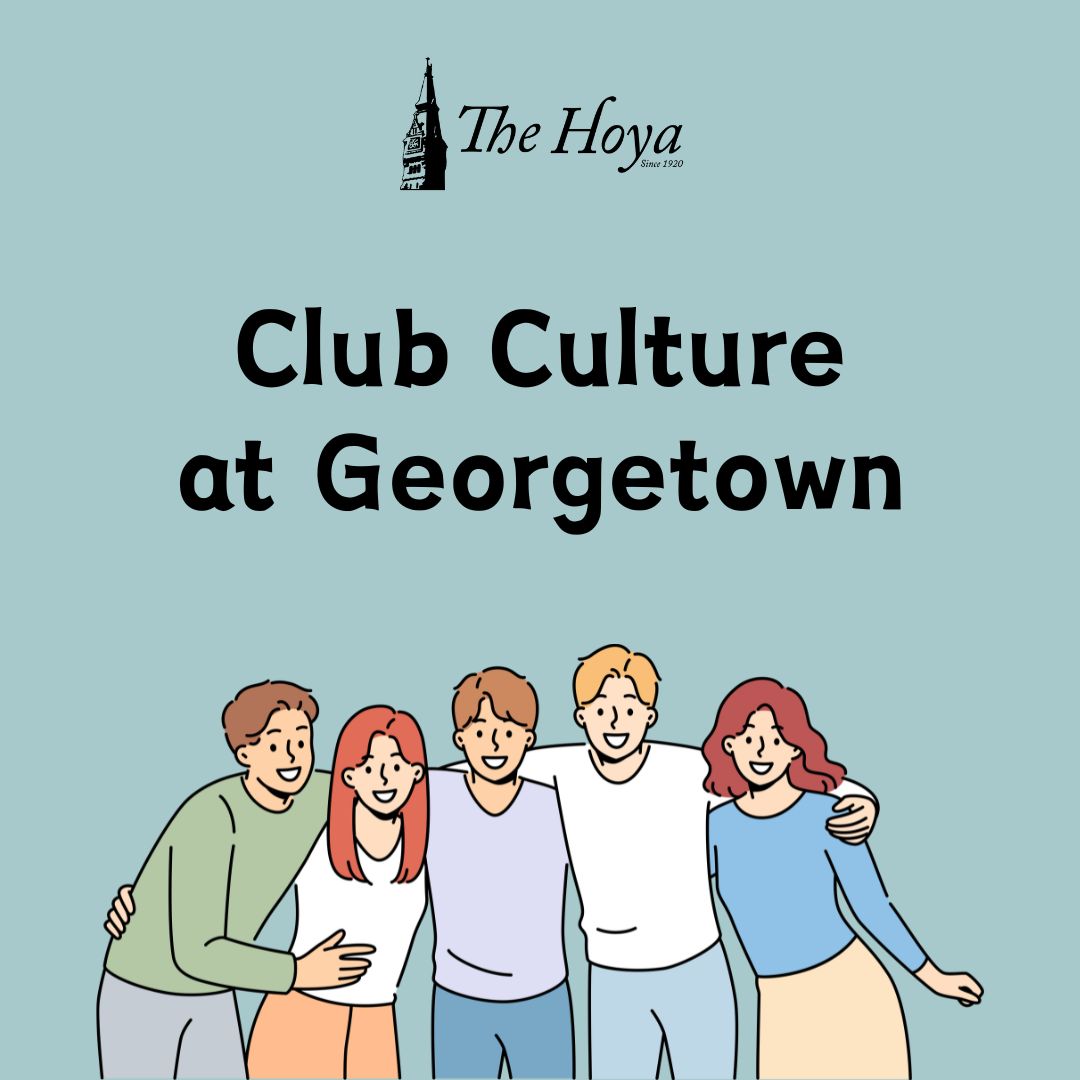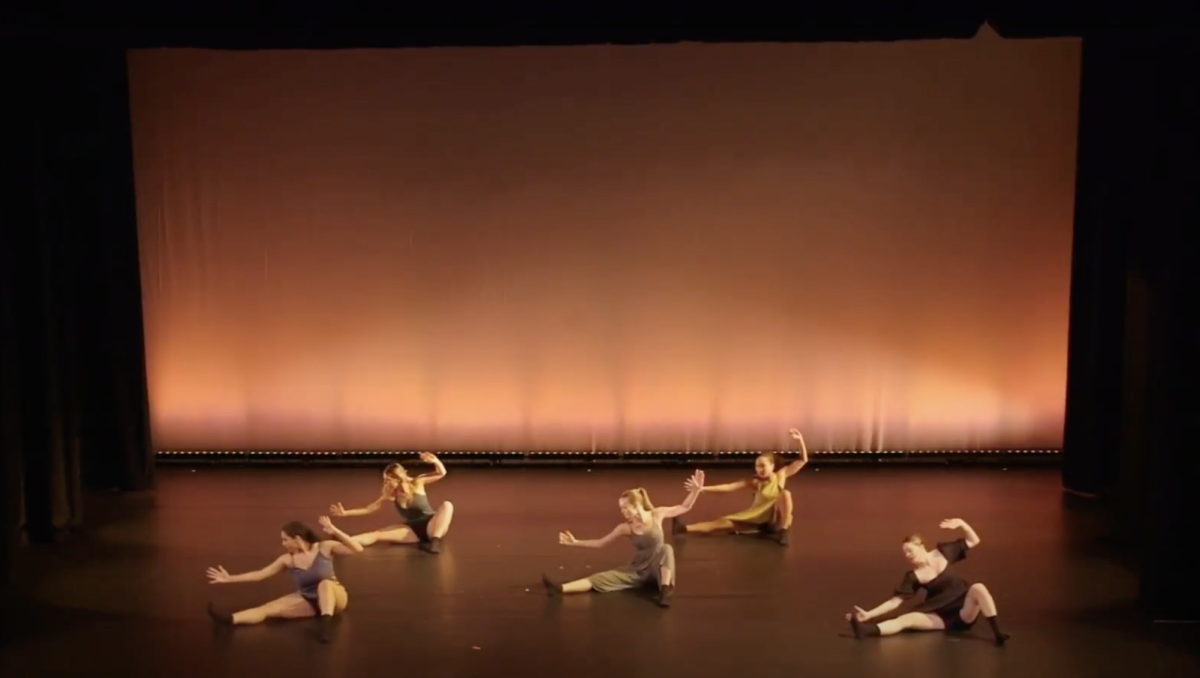Transcript
Dyuthi Harikar (DH): Hi everyone! Welcome back to the Multimedia section of The Hoya. Today we’re going to cover an issue that is regularly discussed on campus, especially at the start of each semester: Georgetown’s club culture. In this podcast, we’ll be covering this part of university life from a first-year perspective. Let’s get into how our first-years are navigating, and dare I say coping, with the club culture here at Georgetown.
On their university website, Georgetown states that it has over 350 clubs and organizations. CampusGroups, a community platform, lists several of these clubs, but itself does not seem to be a very useful resource.
Rylie Hannon, a first-year in the college, was frustrated coming into Georgetown and feeling unclear about clubs that the university had to offer.
Rylie Hannon: I’m a freshman in the College and I’ve had a really difficult time of finding which clubs are available for freshmen on campus. I was unable to go to the CAB Fair at the beginning of the first semester, and I found that the online resources that were available were very outdated and difficult to use. And many of the clubs that are on the CampusGroups website don’t have Instagrams and are not currently active at Georgetown. And so without going to the CAB Fair, it was very difficult to find out the information and the dates or even what was available for me to join. So I wish that there was a little bit more resources because not everything can be on a poster and I feel like I missed out on the application process at the beginning of the year. So I’m starting from scratch for second semester.
DH: In light of the limited online resources that seem available for information on clubs, Parisa Braun, another first-year in the College, says that the best way to find clubs is through people you already know.
Parisa Braun (PB): For me, I found the most success in applying to clubs where I had a friend, or a friend of a friend, who could give me more information and help me navigate the application process. I think my clubs being less competitive at the initial stage gave me the opportunity to challenge myself by applying to leadership positions. This is where the process definitely intensified a bit, but I still felt like I had a strong grasp on the type of candidate they were looking for, and the application felt more skill-based than an arbitrary test of character like I’ve heard about from other clubs on campus.
DH: Speaking of intense application processes, many of the clubs on campus, especially the business and consulting clubs, are known for their essay questions and multiple interviews. The McDonough School of Business Student Advisory Board has taken steps this year to combat this exclusivity by applying an “access to benefits” policy to MSB clubs since the Fall 2023 semester. This means that organizations with university funding are required to have open access periods, which allow general membership. If you want to know more about these changes, The Hoya has an article on the new MSB policies written by Georgia Russello (CAS ’26). Yet, even with these measures to ensure belonging, some students feel that the exclusivity persists. Nik Mukhin, a first-year student in the MSB, often felt frustrated navigating the business clubs on campus.
Nik Mukhin: So I think many students can express a lot of grievances in relation to clubs. It’s a highly difficult, very emotionally-complicated experience, especially here at Georgetown I would say. I think my biggest grievance coming in as a freshman to the school was definitely the, in my opinion, very poorly designed open membership program. The university has basically designed it in a way that students can commit themselves for an entire semester to a multitude of different clubs, upwards of five, six, seven clubs if you really wanted to and still after an entire semester you could be denied access into the club, so you’re never really guaranteed a spot. So it really kind of feels like this facade by the university to kind of include everyone and claim that you’re part of an organization when in fact the only component of the club that you’re getting through the open access program is the education component. You don’t get any of the social events, you don’t get the networking, you don’t get the alumni. So it’s a very, very disheartening experience I would say and definitely not the way for the university to include students in the on-campus organizations.
DH: Amid the competitive club culture, some first-years like Parisa say that your club experience may vary depending on your school or major.
PB: I think the club culture at Georgetown really depends on the types of clubs you’re trying to join. There is definitely no doubt that the MSB consulting and investment clubs are super cutthroat, but my personal experience with clubs has been a lot more lax.
As a government major, the types of clubs I’ve joined are more pre-law and politically focused, which are abundant on campus. I’m in Georgetown Political Strategy, which is a political consulting club, and the Georgetown ACLU.
DH: Other first-year students, like Crede Janson, understand the exclusivity but also think that club accessibility should be expanded.
Crede Janson: Before coming to Georgetown, I had heard of the club culture but not necessarily believed in its widespread practice. That being said, in my first semester as a first year, I did not apply to clubs that required applications, but joined a few that were open membership, such as the Georgetown University Grilling Society and the Georgetown University Skiing Club.
I genuinely love these clubs and their acceptance of all purely based on a common interest regardless of application. However, during my second semester, I decided to apply to a few clubs that were more selective in membership, such as the Georgetown Chimes, GUASFCU [Georgetown University Alumni and Student Federal Credit Union] and Blue and Gray.
I would say that these clubs’ selectiveness is not necessarily bad, but simply ensures that each member is genuinely invested in the given club’s mission. I do think that accessibility for all Georgetown students to participate in a club that they find enjoyable should be permitted and expanded to strengthen the Georgetown community ultimately.
DH: Despite this selectiveness, first-years Francyne Diola, a student in the School of Nursing, and Kira Casler, a student in the School of Foreign Service, are taking a more lighthearted approach to clubs.
Francyne Diola: As a freshman, I definitely have had some trouble navigating all of the clubs, the different cultures that surround them, and then figuring out which community I feel the most drawn to or that I belong to the most.
Recently I have found that a lot of the clubs that I’m interested in have very difficult and competitive application processes and that can be very discouraging from the get-go. So recently I’ve been more drawn to clubs that focus more on things like volunteer work or hobbies like knitting or cultural clubs and in that way you can still find a community at Georgetown without having to kind of fight your way to get to join this club that seems a little bit more challenging and more exclusive. And to me personally, that feels more fulfilling.
Kira Casler: My name is Kira and I’m a freshman in the School of Foreign Service. In my experience at Georgetown, club culture has been really fun. I know that it has a reputation of being very competitive and sometimes toxic, but I think that really comes down to which clubs you’re interested in and how stressed you make yourself.
Personally I knew that coming in freshman year I was going to struggle with the transition to college in other ways so I stuck to clubs that were fun and had no applications. This semester, as I’ve grown more acclimated and comfortable, I’ve applied to a few more and I’m really enjoying those as well.
I think it’s important to remember that clubs should be something you look forward to, whether that’s for the people or the experiences and never a chore. It’s also important to note that you don’t have to join every club your freshman fall.
I’m a member of Georgetown Program Board, Georgetown Political Strategy, the club swim team and instructor for SNUGS where I teach special needs swim lessons, a publicity captain for GAAP which is our student ambassador program and most recently a new member of our ballroom dance team which I have zero experience in but can’t wait to get better at.
DH: Club culture at Georgetown can be hard to navigate, but it looks like our first-years are finding their own ways to adjust to this big part of university life. Whether you are searching for pre-professional opportunities or simply a sense of community, Georgetown ultimately seems to have something for everyone. Thank you all for listening and a shoutout to those who shared their experiences with The Hoya. Keep checking in for further podcasts and more! This podcast was edited by me and produced by Emily Han and Sofia Nathoo.
Music by Dogisreal from Tunetank.








